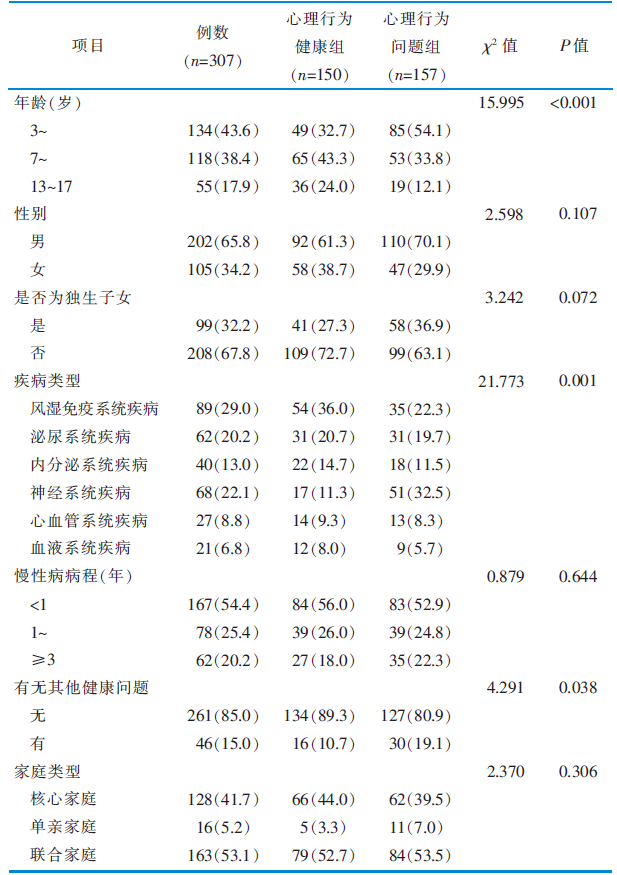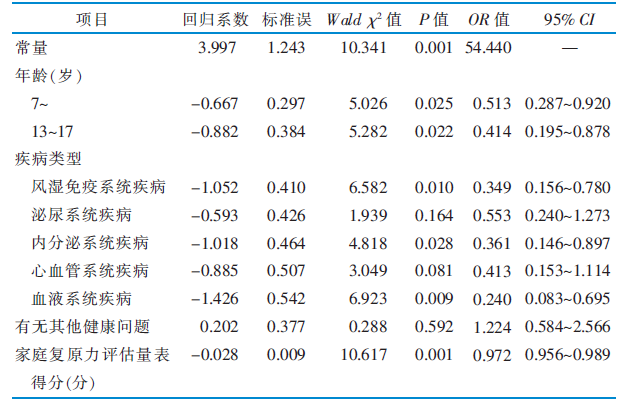


中华护理杂志 ›› 2022, Vol. 57 ›› Issue (14): 1717-1723.DOI: 10.3761/j.issn.0254-1769.2022.14.008
收稿日期:2021-12-14
出版日期:2022-07-20
发布日期:2022-07-20
通讯作者:
董超群,E-mail: dcq@wmu.edu.cn作者简介:江思思:女,硕士,讲师,E-mail: jss@wmu.edu.cn
基金资助:
JIANG Sisi( ), REN Liya, WANG Yuxin, CHEN Meijia, DONG Chaoqun(
), REN Liya, WANG Yuxin, CHEN Meijia, DONG Chaoqun( )
)
Received:2021-12-14
Online:2022-07-20
Published:2022-07-20
摘要:
目的 探讨慢性病患儿心理行为适应特征的潜在类别,比较不同类别慢性病患儿在人口学特征及家庭复原力上的差异,分析潜在类别的影响因素。 方法 采用便利抽样法,选取2019年6月—9月在上海市与浙江省4所三级甲等医院门诊就诊或住院的307名慢性病患儿家长作为调查对象,采用一般人口学资料问卷、长处与困难问卷(家长版)和家庭复原力评估量表进行调查。对慢性病患儿的心理行为适应特征进行潜在类别分析,并通过单因素分析和Logistic回归识别其潜在类别的影响因素。 结果 慢性病患儿的心理行为适应特征分为3个潜在类别,分别为心理行为健康组(48.9%)、多动-低亲社会行为组(48.2%)、高心理行为问题组(2.9%)。将高心理行为问题组、多动-低亲社会行为组合并为心理行为问题组,进行Logistics回归分析。结果显示,年龄、疾病类型和家庭复原力是患儿心理行为适应特征潜在类别的影响因素。 结论 慢性病患儿的心理行为适应特征存在异质性,可分为3个潜在类别。年龄较小、患有神经系统疾病、低家庭复原力的患儿出现心理行为问题的风险更高。
江思思, 任丽亚, 王宇鑫, 陈美佳, 董超群. 慢性病患儿心理行为适应特征的潜在类别分析[J]. 中华护理杂志, 2022, 57(14): 1717-1723.
JIANG Sisi, REN Liya, WANG Yuxin, CHEN Meijia, DONG Chaoqun. Latent class analysis of psychological behavior adaption among children with chronic diseases[J]. Chinese Journal of Nursing, 2022, 57(14): 1717-1723.
 |
表1 慢性病患儿的一般资料及心理行为适应特征潜在类别的单因素分析[例(百分比,%)]
Table 1 Demographic characteristics and univariate analysis of latent classes of psychological behavior adaption in children with chronic diseases[case(percentage,%)]
 |
 |
表2 慢性病患儿心理行为适应特征的潜在类别模型拟合结果(n=307)
Table 2 Model fit results of latent classes for psychological behavior adaption in children with chronic diseases(n=307)
 |
 |
表3 不同心理行为适应特征潜在类别患儿的家庭复原力比较(n=307)
Table 3 Comparison of family resilience in different classes of psychological behavior adaption of children with chronic diseases(n=307)
 |
 |
表5 慢性病患儿心理行为适应特征潜在类别的Logistic回归分析结果
Table 5 Logistic regression of latent classes of psychological behavior adaption in children with chronic diseases
 |
| [1] | 马淑婧, 羊柳, 赵敏, 等. 1991—2015年中国儿童青少年血压水平及高血压检出率的变化趋势[J]. 中华高血压杂志, 2021, 29(2):200. |
| Ma SJ, Yang L, Zhao M, et al. Changing trends in the levels of blood pressure and prevalence of hypertension among Chinese children and adolescents from 1991 to 2015[J]. Chin J Hyper-tens, 2021, 29(2):200. | |
| [2] |
Ferro MA, Boyle MH. The impact of chronic physical illness,maternal depressive symptoms,family functioning,and self-esteem on symptoms of anxiety and depression in children[J]. J Abnorm Child Psychol, 2015, 43(1):177-187.
DOI PMID |
| [3] | 贾晓波. 心理适应的本质与机制[J]. 天津师范大学学报(社会科学版), 2001, 73(1):19-23. |
| Jia XB. The nature and mechanism of mental adaptation[J]. Tianjin Norm Univ J, 2001, 73(1):19-23. | |
| [4] | 李娜娜, 刘伟, 杨凤华. 慢性病患儿应激源压力水平分布及应对方式和心理状态分析[J]. 中国卫生工程学, 2019, 18(5):727-729. |
| Li NN, Liu W, Yang FH. Stress level distribution,coping style and psychological state analysis of children with chronic diseases[J]. Chin J Public Heal Eng, 2019, 18(5):727-729. | |
| [5] |
Pyngottu A, Werner H, Lehmann P, et al. Health-related quality of life and psychological adjustment of children and adolescents with pacemakers and implantable cardioverter defibrillators:a systematic review[J]. Pediatr Cardiol, 2019, 40(1):1-16.
DOI PMID |
| [6] |
Mori M, Krumholz HM, Allore HG. Using latent class analysis to identify hidden clinical phenotypes[J]. JAMA, 2020, 324(7):700-701.
DOI URL |
| [7] |
Walsh F. Family resilience:a developmental systems framework[J]. Eur J Dev Psychol, 2016, 13(3):313-324.
DOI URL |
| [8] |
Nabors L, Liddle M, Graves ML, et al. A family affair:supporting children with chronic illnesses[J]. Child Care Health Dev, 2019, 45(2):227-233.
DOI URL |
| [9] |
Dong CQ, Wu QH, Pan YZ, et al. Family resilience and its association with psychosocial adjustment of children with chronic illness:a latent profile analysis[J]. J Pediatr Nurs, 2021, 60:e6-e12.
DOI URL |
| [10] | 陈峰. 医用多元统计分析方法[M]. 北京: 中国统计出版社, 2000. |
| Chen F. Multivariate statistical analysis for medical use[M]. Beijing: China Statistics Press, 2000. | |
| [11] | 刘广增, 张大均, 朱政光, 等. 家庭社会经济地位对青少年问题行为的影响:父母情感温暖和公正世界信念的链式中介作用[J]. 心理发展与教育, 2020, 36(2):240-248. |
| Liu GZ, Zhang DJ, Zhu ZG, et al. The effect of family socioeconomic status on adolescent problem behaviors:the chain mediating role of parental emotional warmth and belief in a just world[J]. Psychol Dev Educ, 2020, 36(2):240-248. | |
| [12] | 董超群, 高晨晨, 赵海峰. 家庭复原力评估量表汉化及用于慢性病患儿家庭的信效度分析[J]. 护理学杂志, 2018, 33(10):93-97. |
| Dong CQ, Gao CC, Zhao HF. Reliability and validation of Family Resilience Assessment Scale in the families raising children with chronic disease[J]. J Nurs Sci, 2018, 33(10):93-97. | |
| [13] |
Du YS, Kou JH, Coghill D. The validity,reliability and normative scores of the parent,teacher and self report versions of the Strengths and Difficulties Questionnaire in China[J]. Child Adolesc Psychiatry Ment Health, 2008, 2(1):8.
DOI URL |
| [14] | 寇建华, 杜亚松, 夏黎明. 儿童长处和困难问卷(父母版)上海常模的信度和效度[J]. 上海精神医学, 2005, 17(1):25-28. |
| Kou JH, Du YS, Xia LM. Reliability and validity of “Children Strengths and Difficulties Questionnaire” in Shanghai norm[J]. Shanghai Arch Psychiatry, 2005, 17(1):25-28. | |
| [15] | 王孟成, 毕向阳. 潜变量建模与Mplus应用:进阶篇[M]. 重庆: 重庆大学出版社, 2018. |
| Wang MC, Bi XY. Latent variable modeling and Mplus application(advanced)[M]. Chongqing: Chongqing University Press, 2018. | |
| [16] | 周浩, 龙立荣. 共同方法偏差的统计检验与控制方法[J]. 心理科学进展, 2004, 12(6):942-950. |
| Zhou H, Long LR. Statistical remedies for common method biases[J]. Adv Psychol Sci, 2004, 12(6):942-950. | |
| [17] |
Kritikos TK, Stiles-Shields C, Winning AM, et al. A systematic review of benefit-finding and growth in pediatric medical populations[J]. J Pediatr Psychol, 2021, 46(9):1076-1090.
DOI PMID |
| [18] | Weiss AK, Quinn SM, Danley AL, et al. Burnout and perceptions of stigma and help-seeking behavior among pediatric fellows[J]. Pediatrics, 2021, 148(4):e2021050393. |
| [19] |
Ballardini N, Kramer MS, Oken E, et al. Associations of atopic dermatitis and asthma with child behaviour:results from the PROBIT cohort[J]. Clin Exp Allergy, 2019, 49(9):1235-1244.
DOI PMID |
| [20] | 谢倩雯, 季庆英, 戴晓露. 慢性病患儿的心理社会功能及干预策略[J]. 医学与哲学, 2018, 39(12):74-77. |
| Xie QW, Ji QY, Dai XL. Psychosocial functioning of children with chronic illnesses and interventions[J]. Med Philos, 2018, 39(12):74-77. | |
| [21] |
Ferro MA, Qureshi SA, Shanahan L, et al. Health-related quality of life in children with and without physical-mental multimorbidity[J]. Qual Life Res, 2021, 30(12):3449-3461.
DOI URL |
| [22] | 蔡素平, 王亚静, 叶敏. 家庭环境与学龄前儿童心理行为问题的相关研究[J]. 医学理论与实践, 2021, 34(9):1600-1602. |
| Cai SP, Wang YJ, Ye M. The relationship between family environment and children’s psychological and behavioral problems[J]. J Med Theory Pract, 2021, 34(9):1600-1602. | |
| [23] | 刘洋, 莫霖, 石林, 等. 以家庭为中心的社区干预对学龄前恶性肿瘤儿童生存质量的效果评价[J]. 中华护理杂志, 2016, 51(4):395-399. |
| Liu Y, Mo L, Shi L, et al. Effects of community intervention on quality of life in preschool children with malignant tumors[J]. Chin J Nurs, 2016, 51(4):395-399. | |
| [24] |
Cobham VE, Hickling A, Kimball H, et al. Systematic review:anxiety in children and adolescents with chronic medical conditions[J]. J Am Acad Child Adolesc Psychiatry, 2020, 59(5):595-618.
DOI URL |
| [25] |
蔡立柏, 刘延锦, 孙箫音, 等. 青少年癫痫患者疾病感受和体验的质性研究[J]. 中华护理杂志, 2021, 56(1):86-91.
DOI |
| Cai LB, Liu YJ, Sun XY, et al. A qualitative research on perceptions and experience of adolescents with epilepsy[J]. Chin J Nurs, 2021, 56(1):86-91. | |
| [26] |
Myers RM, Balsamo L, Lu XM, et al. A prospective study of anxiety,depression,and behavioral changes in the first year after a diagnosis of childhood acute lymphoblastic leukemia:a report from the Children’s Oncology Group[J]. Cancer, 2014, 120(9):1417-1425.
DOI URL |
| [27] |
Bethell CD, Gombojav N, Whitaker RC. Family resilience and connection promote flourishing among US children,even amid adversity[J]. Health Aff (Millwood), 2019, 38(5):729-737.
DOI URL |
| [28] | 章景丽, 陈瑞美, 陈秋, 等. 家庭因素与学龄前儿童情绪与行为问题的关联研究[J]. 中华疾病控制杂志, 2019, 23(2):168-171. |
| Zhang JL, Chen RM, Chen Q, et al. Impact of home environment on emotional and behavioral problems in preschool children[J]. Chin J Dis Control Prev, 2019, 23(2):168-171. |
| [1] | 成磊, 钱佳艺, 段明霞, 黄海英, 王颖雯. 专业照护者感知的癌症患儿向成人过渡影响因素的质性研究[J]. 中华护理杂志, 2022, 57(9): 1048-1053. |
| [2] | 刘美华, 彭剑雄, 罗翠, 郑焱, 朱丽辉, 肖政辉, 张新萍, 李庆博, 熊亮. 机械通气患儿早期活动方案的构建及应用研究[J]. 中华护理杂志, 2022, 57(8): 901-907. |
| [3] | 孙丽, 胡成文, 刘群慧, 方敏, 顾道琴, 许宝惠. 1例急性白血病患儿的安宁疗护实践[J]. 中华护理杂志, 2022, 57(8): 992-995. |
| [4] | 傅来建, 卢芳燕. 1例肝移植术后肺部卡氏肺孢子感染并发颅内出血患儿的护理[J]. 中华护理杂志, 2022, 57(8): 996-1000. |
| [5] | 张娟, 何娇, 罗黎, 张岚, 韩燕红. 新生儿医用粘胶相关性皮肤损伤预防及管理的最佳证据总结[J]. 中华护理杂志, 2022, 57(8): 1008-1012. |
| [6] | 赵丽华, 万兴丽, 朱友菊, 蒲倩婷, 胡艳玲, 史泽瑶, 刘玉兰, 陈晓娟, 付丽. NICU早产儿基于行为线索的经口喂养模式的研究进展[J]. 中华护理杂志, 2022, 57(8): 1013-1018. |
| [7] | 黄勤, 张晓波, 顾莺, 胡静, 孔梅婧, 傅唯佳. 儿童静脉输液过程质量监控数据表的构建及应用[J]. 中华护理杂志, 2022, 57(7): 823-826. |
| [8] | 余群飞, 张玉萍, 任英, 许国萍, 马姚静, 赵腾飞. 1例Ⅲ型戈谢病伴重度脊柱后凸畸形患儿的围手术期护理[J]. 中华护理杂志, 2022, 57(6): 736-739. |
| [9] | 孙柳, 王莹, 梁嘉贵, 陈少华, 刘均娥. 老年人应对慢性病共病体验的Meta整合[J]. 中华护理杂志, 2022, 57(6): 748-755. |
| [10] | 林楠, 诸纪华, 徐红贞, 周红琴. 早产儿体位管理的最佳证据总结[J]. 中华护理杂志, 2022, 57(4): 486-492. |
| [11] | 吕璐洋, 王华芬, 卢芳燕, 王燕, 郑力. 住院患儿家庭出院准备度评估工具的研究进展[J]. 中华护理杂志, 2022, 57(4): 507-512. |
| [12] | 张习莹, 江智霞, 刘其兰, 何曼曼, 张芳, 向黔灵, 胡汝均. ICU后综合征患者疲劳轨迹的潜在类别及影响因素分析[J]. 中华护理杂志, 2022, 57(3): 272-278. |
| [13] | 慎斐, 罗飞翔, 商祯茹, 凌云. 吊床体位促进早产儿生长发育效果的研究[J]. 中华护理杂志, 2022, 57(3): 301-305. |
| [14] | 谢帅华, 杨芹, 吴旭红, 蒋衍, 李烨文, 周佳, 李微, 黑明燕. 早产儿经口置入胃管置管长度测量方法的改良及效果评价[J]. 中华护理杂志, 2022, 57(2): 193-196. |
| [15] | 卢露, 卢芳燕, 张婉莹, 姚彩萍. 1例肝豆状核变性并发肾功能衰竭患儿行肝移植术的护理[J]. 中华护理杂志, 2022, 57(2): 208-211. |
| 阅读次数 | ||||||
|
全文 |
|
|||||
|
摘要 |
|
|||||